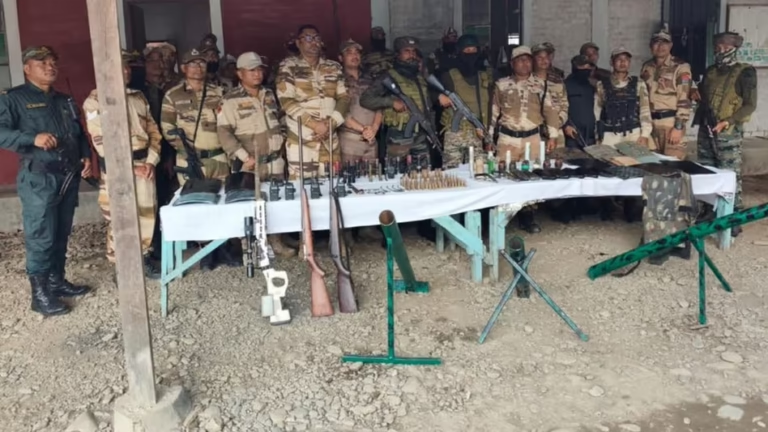Manipur Congress Criticizes Mizoram CM’s Remarks on Kuki-Zo Unity
Introduction
In a move that has stirred political tension, the Manipur Pradesh Congress Committee (MPCC) expressed serious concern over Mizoram Chief Minister Lalduhoma’s recent statements regarding Kuki-Zo unity. The remarks, which suggested a unified Kuki identity that transcends current national borders, were condemned by the MPCC as potentially divisive and damaging to India’s integrity. This article delves into the implications of these statements, the MPCC’s response, and how this incident reflects broader political and social issues.
What Did Mizoram’s Chief Minister Say?
During an event addressing the Kuki diaspora in the United States, Mizoram CM Lalduhoma voiced support for a unified Kuki-Zo people under a singular leadership, even if this meant crossing the borders between India, Myanmar, and Bangladesh. He referred to the Kuki community as “one people, divided unfairly,” which struck a nerve, particularly in Manipur. The MPCC quickly responded, expressing that such remarks undermine the unity and sovereignty of both Manipur and India.
The statements were further endorsed by Mizoram’s Information and Public Relations department, giving the remarks an official weight that has only intensified concerns in neighboring states.
Manipur Congress’s Standpoint
The MPCC, represented by spokesperson Hareshwar Goswami, condemned the remarks, calling them “unfortunate” and potentially inflammatory. According to Goswami, these statements disregard India’s unified structure and parliamentary democracy. He questioned why the BJP-led government has not responded, suggesting that this lack of response could embolden other divisive forces.
The MPCC fears that endorsing such sentiments could encourage fragmentation within Manipur, potentially escalating ethnic and regional tensions. Goswami emphasized that unity is paramount for peace and progress and that India’s national integrity should not be compromised for any group’s agenda.
Broader Political and Social Implications
The discussion around Kuki-Zo unity and identity highlights long-standing ethnic and regional sensitivities within India’s northeastern states. The Kuki community, spread across various regions including Manipur, Mizoram, Myanmar, and Bangladesh, has a complex history of migration, integration, and cultural preservation.
Mizoram’s endorsement of Kuki unity resonates with ethnic ties but clashes with the principles of national borders and state sovereignty. This situation brings to light the delicate balance needed to manage regional ethnic identities within a unified national framework. Politically, it raises questions about how states should address transnational ethnic ties without compromising the nation’s unity.
Manipur’s Concerns and the Call for Government Action
The MPCC’s reaction reflects a deep-seated concern for Manipur’s stability, particularly given the state’s history of ethnic conflicts and movements for autonomy. Goswami called on both the state and central governments to address the matter directly. His call for action is not merely a political statement but a warning that overlooking such rhetoric could risk national security.
For Manipur, unity isn’t just a political ideal; it’s essential to maintaining harmony among its diverse communities. The Congress has underscored its commitment to safeguarding India’s sovereignty and preventing narratives that may fuel divisions. This incident, thus, serves as a reminder of the need for vigilance and responsibility in political discourse, particularly when sensitive ethnic matters are involved.
Unity vs. Ethnic Identity: A Delicate Balance
This controversy underlines the challenge India faces in balancing regional ethnic identities with national unity. The northeastern region, with its diverse ethnic composition and cross-border affiliations, often grapples with such issues. The Kuki, Naga, and other ethnic groups share cultural and linguistic connections across borders, making identity politics in these regions particularly nuanced.
India’s approach to national unity must include respecting ethnic identities without allowing them to destabilize its sovereignty. Political leaders must tread carefully, acknowledging these identities while maintaining respect for state boundaries. The recent remarks from Mizoram’s CM underscore how fragile this balance can be and how critical responsible discourse is in such matters.
Political Repercussions for the BJP
Interestingly, the MPCC questioned why the BJP-led government, at both the state and central levels, has not addressed Lalduhoma’s remarks. This silence, the Congress suggests, could be interpreted as tacit approval or negligence, which could further embolden divisive rhetoric. This brings the BJP under scrutiny, as it is often viewed as the custodian of national unity.
By remaining silent, the BJP risks allowing the opposition to shape the narrative, potentially impacting its influence in Manipur and other northeastern states. The Congress party’s response may place pressure on the BJP to take a firmer stance on issues related to regional unity and national sovereignty.
The Role of Regional Cooperation
For lasting stability in India’s northeastern states, inter-state cooperation is essential. States must support each other in maintaining peace, upholding constitutional values, and managing sensitive ethnic issues. Regional cooperation ensures that states address complex matters like transnational ethnic ties together, with shared interests in preserving unity and peace.
Political leaders must approach ethnic concerns with empathy and caution, aligning their actions with national interests. The recent controversy surrounding Mizoram’s CM provides a case study on how regional cooperation, coupled with a commitment to unity, can address ethnic issues without risking division.
Conclusion
The MPCC’s response to Mizoram CM Lalduhoma’s statements underscores the complexities of regional and ethnic politics in India’s northeast. While acknowledging and celebrating ethnic identities is crucial, it must be done within the bounds of national sovereignty. The Congress party’s swift response reflects its commitment to maintaining India’s unity and the social harmony within Manipur.
This incident serves as a reminder of the delicate balance between respecting ethnic identities and preserving a unified national identity. As regional politics continue to evolve, it remains vital for India’s leaders to approach these issues responsibly, prioritizing unity, cooperation, and peace.
FAQs
- What did Mizoram CM Lalduhoma say about Kuki-Zo unity?
- He called for a united Kuki-Zo people across India, Myanmar, and Bangladesh, which sparked concerns in Manipur.
- Why did the Manipur Congress react strongly to this?
- The MPCC believes the statement undermines India’s unity and could create divisive sentiments within the region.
- What role did the Mizoram government play in endorsing this statement?
- Mizoram’s Department of Information and Public Relations reportedly endorsed the CM’s statement, giving it an official stance.
- How might this affect regional politics in Manipur?
- It could intensify ethnic and regional tensions, making unity efforts more challenging in Manipur.
- What actions has the Manipur Congress called for?
- The MPCC urged the government to respond firmly to the statement, viewing it as essential to maintaining social stability.



